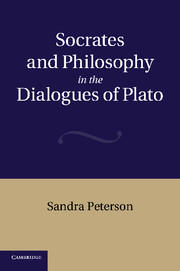Book contents
- Frontmatter
- Contents
- Acknowledgments
- Abbreviations
- Preface
- Chapter 1 Opposed hypotheses about Plato's dialogues
- Chapter 2 Socrates in the Apology
- Chapter 3 Socrates in the digression of the Theaetetus:
- Chapter 4 Socrates in the Republic, part i: speech and counter-speech
- Chapter 5 Socrates in the Republic, part ii: philosophers, forms, Glaucon, and Adeimantus
- Chapter 6 Socrates in the Phaedo: another persuasion assignment
- Chapter 7 Others' conceptions of philosophy in the Euthydemus, Lovers, and Sophist
- Chapter 8 Socrates and Plato in Plato's dialogues
- Chapter 9 Socrates and philosophy
- Bibliography
- Index of passages cited
- General index
Chapter 7 - Others' conceptions of philosophy in the Euthydemus, Lovers, and Sophist
Published online by Cambridge University Press: 03 May 2011
- Frontmatter
- Contents
- Acknowledgments
- Abbreviations
- Preface
- Chapter 1 Opposed hypotheses about Plato's dialogues
- Chapter 2 Socrates in the Apology
- Chapter 3 Socrates in the digression of the Theaetetus:
- Chapter 4 Socrates in the Republic, part i: speech and counter-speech
- Chapter 5 Socrates in the Republic, part ii: philosophers, forms, Glaucon, and Adeimantus
- Chapter 6 Socrates in the Phaedo: another persuasion assignment
- Chapter 7 Others' conceptions of philosophy in the Euthydemus, Lovers, and Sophist
- Chapter 8 Socrates and Plato in Plato's dialogues
- Chapter 9 Socrates and philosophy
- Bibliography
- Index of passages cited
- General index
Summary
COMPARISON OF SOME ACCOUNTS OF PHILOSOPHY
The dialogues that chapters 2–6 considered present several different conceptions of philosophy. At Apology 29d–e Socrates says that his philosophizing involves challenging, examining, and reproaching. The Apology also shows awareness, however, that some audience members conceive of philosophizing differently from Socrates. Their different conception counts considering what is in the heavens and under the earth as philosophizing (Apology 23d). Socrates denies conversing on those topics.
The Theaetetus' Socrates gives Thales as example of a philosophizer (174a–b). Thales' doing astronomy would put him into the group that the Socrates of the Apology says he is not part of. The Theaetetus digression describes a philosopher with interests very different from the philosophizing Socrates claims in the Apology.
In the Republic Socrates says philosophers focus on forms and on being itself. Socrates has to explain for his interlocutors what he means. Adeimantus' preconception that philosophers give inescapable argument to unwelcome conclusions interferes with Adeimantus' keeping Socrates' new explanation in mind.
In the Phaedo Socrates describes philosophers who practice dying.
Various details of Theaetetus, Republic, and Phaedo block any immediate inference that Socrates as depicted includes his own practice under the conceptions of philosophy that he articulates in those dialogues. The Theaetetus' description of philosophy was best understood to be part of a revealing extraction-by-declaration from the unexaminable Theodorus. Socrates offers the Republic and Phaedo descriptions as part of a task of persuading his interlocutors of a conclusion they assign to him.
- Type
- Chapter
- Information
- Socrates and Philosophy in the Dialogues of Plato , pp. 196 - 215Publisher: Cambridge University PressPrint publication year: 2011



